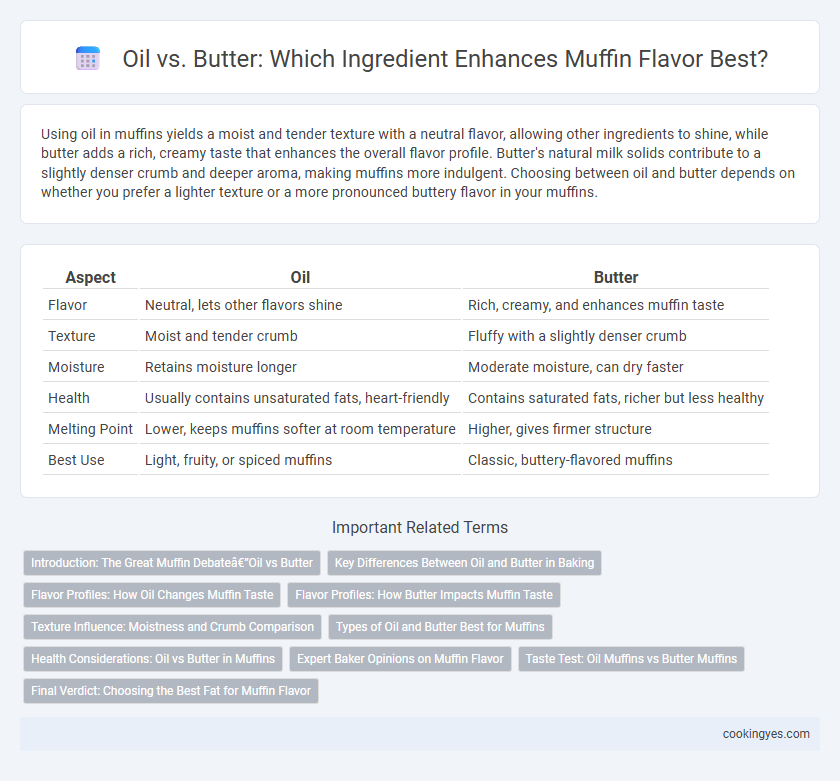Using oil in muffins yields a moist and tender texture with a neutral flavor, allowing other ingredients to shine, while butter adds a rich, creamy taste that enhances the overall flavor profile. Butter's natural milk solids contribute to a slightly denser crumb and deeper aroma, making muffins more indulgent. Choosing between oil and butter depends on whether you prefer a lighter texture or a more pronounced buttery flavor in your muffins.
Table of Comparison
| Aspect | Oil | Butter |
|---|---|---|
| Flavor | Neutral, lets other flavors shine | Rich, creamy, and enhances muffin taste |
| Texture | Moist and tender crumb | Fluffy with a slightly denser crumb |
| Moisture | Retains moisture longer | Moderate moisture, can dry faster |
| Health | Usually contains unsaturated fats, heart-friendly | Contains saturated fats, richer but less healthy |
| Melting Point | Lower, keeps muffins softer at room temperature | Higher, gives firmer structure |
| Best Use | Light, fruity, or spiced muffins | Classic, buttery-flavored muffins |
Introduction: The Great Muffin Debate—Oil vs Butter
Butter-infused muffins deliver a rich, creamy flavor and a tender crumb due to their solid fat content, which contributes to a denser texture. In contrast, oil-based muffins tend to be moister and lighter because liquid oil coats the flour proteins more thoroughly, resulting in a softer bite. Understanding these fat properties is essential for bakers seeking either a buttery richness or a delicate crumb in their muffins.
Key Differences Between Oil and Butter in Baking
Oil creates moist, tender muffins with a neutral flavor, allowing added ingredients to shine, while butter adds a rich, creamy taste and contributes to a denser crumb texture. Butter's water content aids in leavening and gives muffins a golden crust, whereas oil produces softer edges and a longer shelf life. Choosing between oil and butter impacts muffin flavor, texture, and moisture retention, crucial factors for baking success.
Flavor Profiles: How Oil Changes Muffin Taste
Oil enhances muffin flavor by creating a moist, tender crumb and highlighting other ingredients without overpowering them, unlike butter which adds a rich, creamy taste and slightly denser texture. The neutral flavor of oil allows fruit, spices, and extracts to shine more distinctly, resulting in a lighter, more delicate muffin profile. Using oil typically produces a softer mouthfeel and a subtle, consistent flavor ideal for recipes aiming to emphasize complementary flavors.
Flavor Profiles: How Butter Impacts Muffin Taste
Butter enriches muffins with a creamy, rich flavor and a slightly caramelized note that enhances the overall taste experience. Its natural milk fats create a tender crumb and contribute to a golden-brown crust, intensifying the muffin's aroma and mouthfeel. Using butter instead of oil adds depth and complexity to the flavor profile, making muffins taste more indulgent and flavorful.
Texture Influence: Moistness and Crumb Comparison
Butter enhances muffin flavor with a rich, creamy taste and creates a tender crumb due to its solid fat content, which traps air during mixing, resulting in a light, fluffy texture. Oil contributes to a moister muffin by coating flour proteins more evenly, producing a denser, more uniform crumb with a softer bite. The choice between oil and butter significantly impacts muffin moistness and crumb texture, with butter favoring a richer mouthfeel and oil offering superior moisture retention.
Types of Oil and Butter Best for Muffins
Using vegetable oil, canola oil, or mild olive oil enhances muffin moisture and tenderness while keeping a neutral flavor. Unsalted butter, especially European-style with higher fat content, provides rich flavor and a slightly denser crumb ideal for classic muffin recipes. Coconut oil offers a subtle tropical note and works well in healthier or vegan muffins, balancing taste and texture.
Health Considerations: Oil vs Butter in Muffins
Choosing oil over butter in muffins can reduce saturated fat intake, promoting heart health by lowering LDL cholesterol levels. Butter provides richer flavor due to its milk solids and contains fat-soluble vitamins like A and E, but it also increases calories and saturated fats. Health-conscious bakers often prefer oils like canola or olive oil for healthier unsaturated fats and a moist texture without compromising muffin flavor.
Expert Baker Opinions on Muffin Flavor
Expert bakers often emphasize that butter provides a richer, creamier flavor profile in muffins due to its milk solids and natural sugars, enhancing the overall taste and aroma. Oil, while offering a moist and tender crumb, tends to produce a milder flavor that allows other ingredients like fruits or spices to shine more prominently. The choice between oil and butter depends on the desired texture and depth of flavor, with many professionals recommending butter for a more traditional and robust muffin taste.
Taste Test: Oil Muffins vs Butter Muffins
Oil muffins tend to produce a moister and lighter texture, allowing the flavors of the ingredients to shine more subtly, while butter muffins deliver a richer, creamier taste with a dense crumb and a slightly caramelized crust. Taste tests consistently highlight butter muffins as having a more complex and indulgent flavor profile, appealing to those who prefer a classic buttery aroma and mouthfeel. In contrast, oil muffins are favored for their tenderness and moistness, making them a popular choice for healthier or dairy-free recipes.
Final Verdict: Choosing the Best Fat for Muffin Flavor
Butter imparts a rich, creamy flavor and tender crumb to muffins, enhancing their overall taste experience. Oil, while producing moist and soft muffins, delivers a more neutral flavor that allows other ingredients to shine. For the best muffin flavor, butter is typically preferred due to its ability to contribute depth and richness.
Oil vs butter for muffin flavor Infographic

 cookingyes.com
cookingyes.com